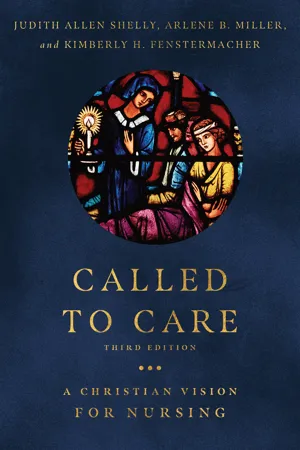
Called to Care
A Christian Vision for Nursing
- 312 pages
- English
- ePUB (mobile friendly)
- Available on iOS & Android
Called to Care
A Christian Vision for Nursing
About this book
Nursing is a vocation: a calling from God to care for others. The role of the nurse originally grew out of a holistic Christian understanding of humans as created in the image of God. Yet as nursing and healthcare continue to change, the effects have proven disorienting to many. Now more than ever, we need nurses who are committed both to a solid understanding of their profession and to caring well for patients and their families.
For over twenty years, Called to Care has served as a unique and essential resource for nurses. In this third edition Judith Allen Shelly and Arlene B. Miller, now joined by coauthor Kimberly H. Fenstermacher, present a definition for nursing based on a historically and theologically grounded vision of the nurse's call:
Nursing is a ministry of compassionate and restorative care for the whole person, in response to God's grace, which aims to promote and foster optimum health (shalom) and bring comfort in suffering and death for anyone in need.
Focusing on the features of the nursing metaparadigm—person, health, environment, and nursing—they provide a framework for understanding how the Christian faith relates to the many aspects of a nurse's work, from theory to everyday practice.
This new edition of Called to Care is thoroughly revised for today's nurses, including updated examples and new content on topics such as cultural competency, palliative care, and the current state of healthcare and nursing education. Each chapter features learning objectives, discussion questions, case studies, and theological reflections from Scripture to help readers engage and apply the content. For educators, students, and practitioners throughout the field of nursing, this classic text continues to provide clarity and wisdom for living out their calling.
Frequently asked questions
- Essential is ideal for learners and professionals who enjoy exploring a wide range of subjects. Access the Essential Library with 800,000+ trusted titles and best-sellers across business, personal growth, and the humanities. Includes unlimited reading time and Standard Read Aloud voice.
- Complete: Perfect for advanced learners and researchers needing full, unrestricted access. Unlock 1.4M+ books across hundreds of subjects, including academic and specialized titles. The Complete Plan also includes advanced features like Premium Read Aloud and Research Assistant.
Please note we cannot support devices running on iOS 13 and Android 7 or earlier. Learn more about using the app.
Information

1
CARING AND
THE CHRISTIAN STORY
Purpose: | To examine the relationship between Christian faith and nursing |
Objectives: | After reading this chapter and completing the exercises, you should be able to:
|
Keywords: | paradigm, story, narrative, history |
HOW DID WE GET HERE?
Table of contents
- Cover
- Title Page
- Dedication Page
- Contents
- Preface to the Third Edition
- Preface
- Part One: Nursing—The Call to Care
- Part Two: The Person—Caring in Relationship
- Part Three: The Environment—Context for Care
- Part Four: Health—Outcomes of Care
- Part Five: Nursing—Practice of Care
- Appendix: Guidelines for Evaluating Alternative Therapies
- Index
- Notes
- Praise for Called to Care
- About the Authors
- More Titles from InterVarsity Press
- Copyright